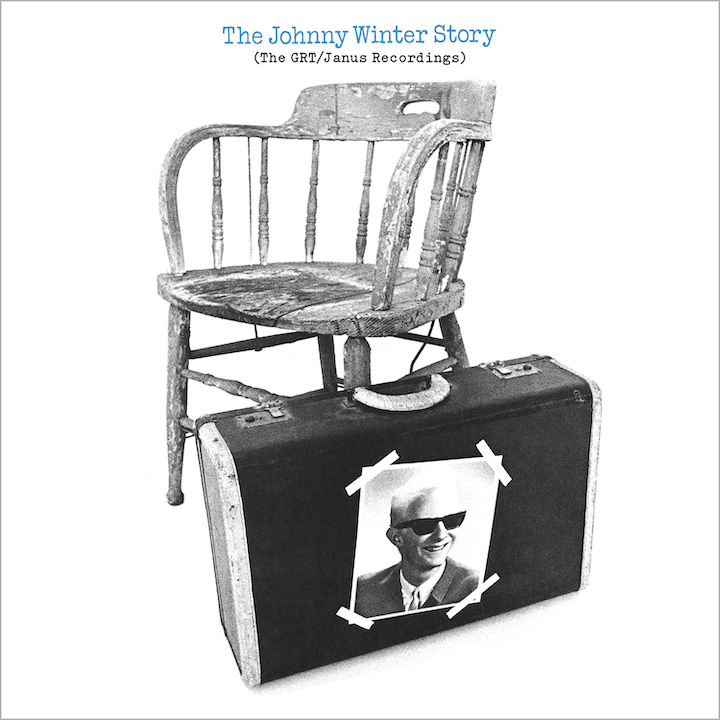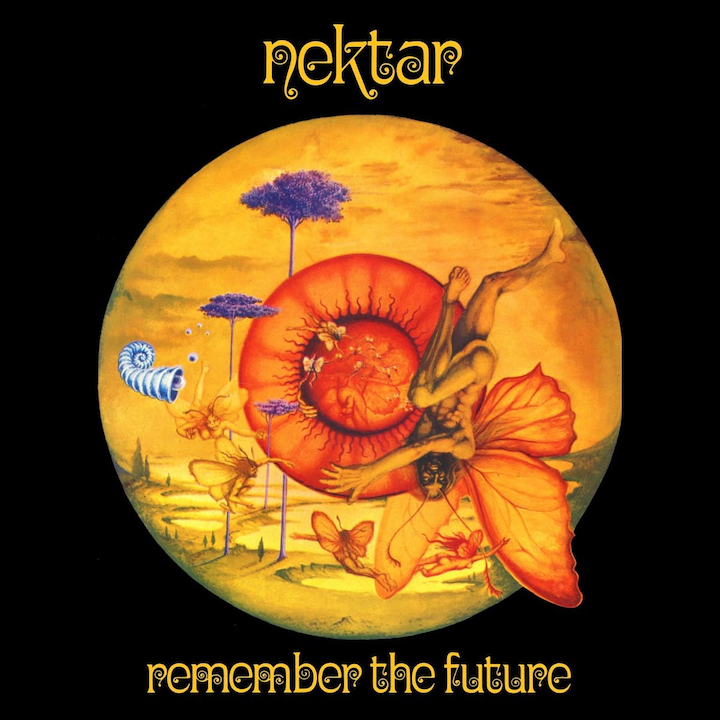The British progressive rock band Nektar formed in Germany in 1969 and has been making music on and off with various lineups ever since. Its biggest success, however, came five decades ago with the release of its fourth album, Remember the Future, which consists solely of its 10-part, approximately 36-minute title track. The record, which has just been reissued in a vastly expanded 50th-anniversary box set, first appeared in November 1973 in Europe. It showed up seven months later in America, where it made Billboard’s Top 20 list and triggered a U.S. tour.
Its success isn’t likely to surprise anyone who hears it, but don’t expect to be wowed by the lyrics on this allegorical concept album. They tell the convoluted and rather inane tale of a bluebird who visits planet Earth and, according to the liner notes, “found that the people who he met couldn’t accept him for what he was rather than how he looked.” The bluebird contacts a blind boy, decides to give him new eyes and wisdom, and eventually departs into space “knowing that his message had at last been heard.” It’s a bit reminiscent of the equally banal Jonathan Livingston Seagull, which came out only a few years earlier.
The good news is that the words don’t matter much; the voices on this album are mostly just another sonic element in Remember the Future’s imaginatively constructed song cycle, which should appeal to fans of such other 1970s prog-rock groups as Yes, Genesis, Jethro Tull, and Emerson, Lake & Palmer. Nektar delivers no long, self-indulgent solos here, just a smartly and tightly constructed composition filled with satisfying changes in style and tempo, strong melodies, and excellent instrumental work by guitarist and lead vocalist Roye Albrighton, keyboardist Allan “Taff” Freeman, drummer Ron Howden, and bassist Derek Moore. (Albrighton died in 2016, Freeman in 2021, and Howden a few months ago; the group’s only remaining original musician is Moore.)
“Take a trip back in time” are the first words sung on the record and that’s what Nektar has been inviting listeners to do for decades because the success of Remember the Future has prompted the release of a series of expanded editions of the album. A 1990 CD, for example, offered an alternate mix while a remastered 2002 edition added two promotional single edits. A 2004 reissue featured that remaster plus another promotional single edit and was offered with a surround-sound mix derived from a 1973 quadraphonic version. Then came a 40th-anniversary two-CD set that included another remix of the original album plus a 14-track 1974 concert that featured much of Remember the Future as well as other numbers.
And now we have a 50th-anniversary, five-disc box, for which the UK’s Esoteric label pulled out all the stops. The first CD in the set – which includes a poster and a well-illustrated booklet – delivers a 2023 remaster of the original album and a bonus concert track while the second offers a new stereo remix of the LP plus two German singles. CDs three and four, meanwhile, capture a well-recorded January 1974 German concert. The nearly two-hour-long show, which has not been previously released, embraces much of Remember the Future plus material from the group’s second, third, and then-forthcoming fifth albums.
The final disc, a Blu-ray, includes three videos, all from 1973: a promotional film for Remember the Futureand two selections from the BBC’s Old Grey Whistle Test, one for “Wings,” a song from the group’s third LP, and one for a medley of “Desolation Valley” and “Waves,” two numbers from its second album.
That last video, the only one to show the band in performance, evidences its penchant for employing more than music to communicate its message: since its earliest days, it has listed light-show creator Mike Brockett as a full member of the group. “What we want to do,” keyboardist Allan Freeman told me after a sold-out St. Louis show in 1974, “is take the audience away completely. Surround them with sounds, visuals, a total theatrical environment.”
Even without the lights, though, their music is enveloping – especially on this box set’s Blu-ray, which, in addition to the videos, offers surround-sound, stereo, and quad mixes of Remember the Future. Played on a 5.1-channel system, the quad mix does a particularly good job of separating the instruments and creating an immersive experience.
Johnny Winter Was Great Before He Was Famous

The Johnny Winter Story is a title that suggests a career overview, but that’s not what you’ll find on this 33-track, two-CD set. Subtitled The GRT/Janus Recordings, it collects remastered versions of three of the blues-rock giant’s pre-fame albums, the first of which is a 1969 release that shares the anthology’s moniker. The other two are About Blues, also from 1969, and Early Times, from 1970.
The included liner notes, reprinted from the first of those three LPs, assert that “the depth and intensity of [Winter’s] interpretive skills are simply, demonstrably astonishing” and that “few men are his equal on the guitar.” Indeed, this album’s 15 originals as well as covers of blues classics by the likes of John Lee Hooker, Charles Brown, Mose Allison, and Bo Diddley leave little doubt that Winter was destined for big things.
The set is notable not only for his vocal and guitar work but for the way it showcases all his early influences, including R&B, blues, gospel, rock, and, on an original number called “Oh My Darling,” even doo-wop.
Jeff Burger’s website, byjeffburger.com, contains five decades’ worth of music reviews, interviews, and commentary. His books include Dylan on Dylan: Interviews and Encounters, Lennon on Lennon: Conversations with John Lennon, Leonard Cohen on Leonard Cohen: Interviews and Encounters, and Springsteen on Springsteen: Interviews, Speeches, and Encounters.



